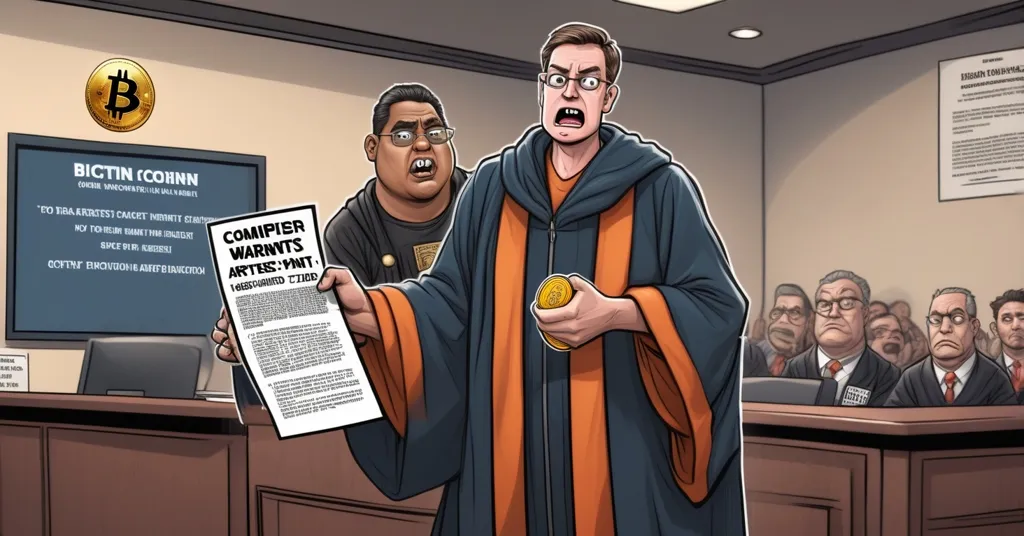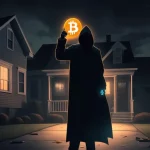West Virginia Court Alerts Public to Bitcoin Scam Using Fake Jury Duty Warrants

West Virginia Court Warns of Sophisticated Bitcoin Scam Involving Fake Jury Duty Arrest Warrants
The U.S. District Court of the Western District of Virginia has issued a critical alert regarding a cunning Bitcoin scam that targets unsuspecting individuals with fake arrest warrants for allegedly missing jury duty. These scammers not only demand payment in Bitcoin or gift cards but also threaten victims with immediate arrest if they fail to comply. This scam highlights the darker side of the burgeoning crypto world, where fraudsters exploit the promise of financial freedom and decentralization.
- Bitcoin scam using fake jury duty arrest warrants
- Scammers demand Bitcoin or gift cards, threaten arrest
- Over $3 billion lost to crypto fraud in 2024
The scam operates by masquerading as court officials, sending out fraudulent arrest warrants that falsely claim to be from the Eastern District of Virginia. The scammers demand payments in Bitcoin, gift cards, or even bank account details, banking on the fear of legal repercussions to coerce victims. But here’s the crucial point to remember:
U.S. district courts do not issue arrest warrants for failing to appear for jury duty unless the individual has been officially summoned.
So, if you receive one of these, it’s a scam, no question about it.
Jury duty, for those unfamiliar, is a civic duty where citizens are randomly selected to serve on a jury for a court case. It’s a fundamental part of the U.S. legal system, but these scammers twist it into a tool for extortion.
The crypto sector has been rocked by fraud and hacks, losing over $3 billion globally in 2024 alone, according to PeckShield. That’s a staggering figure, and it’s not just about the money—it’s about the trust in the system that these scammers are eroding. The FBI has been actively combatting similar scams, such as one they cracked down on in El Paso, Texas, in late 2023, and they’ve issued alerts on other scams on platforms like Telegram and even impersonations of representatives from Binance.
These scams are part of a broader trend of increasingly sophisticated cryptocurrency fraud. Phishing attempts were identified as the most costly type of attack in 2024, with over $1 billion stolen across 296 incidents, according to CertiK. It’s like the digital wild west out there, and the bad actors are getting smarter by the day. But hey, nothing says ‘I’m legit’ like demanding payment in gift cards, right?
However, it’s not all doom and gloom. Law enforcement agencies, including the FBI and international police forces, are fighting back with vigor. They’ve been issuing public warnings, cracking down on these scams, and even recovering some stolen assets. In 2024, approximately $488.5 million of stolen cryptocurrencies were recovered, showing that there’s hope in the fight against these digital thieves.
So, what can you do to protect yourself? First off, if you receive any communication demanding payment in Bitcoin or other cryptocurrencies, especially related to legal matters like jury duty, verify it directly with the court. Don’t let the fear of arrest cloud your judgment. And remember, while Bitcoin and other cryptocurrencies offer incredible potential for financial freedom and decentralization, they also come with risks that we must navigate carefully.
While we celebrate the disruptive potential of Bitcoin and the broader blockchain ecosystem, we must also acknowledge the challenges. Some argue that Bitcoin’s perceived anonymity isn’t the problem; rather, it’s the lack of user education and awareness that fuels these scams. Yet, it’s undeniable that the very features that make Bitcoin revolutionary—decentralization and privacy—are what scammers exploit.
As champions of decentralization and the disruption of the status quo, we must remain vigilant against those who seek to exploit the technologies we believe in. The fight for a more decentralized and free financial future is ongoing, and it’s up to all of us to stay informed and protect ourselves from these scams.
Key Takeaways and Questions
- What is the nature of the scam described?
The scam involves fraudsters impersonating U.S. District Court officials, using fake arrest warrants to extort payments for alleged missed jury duty. They demand payments in Bitcoin or gift cards and threaten victims with arrest if they do not comply.
- How can individuals verify the authenticity of such communications?
Individuals should contact the court directly to verify the authenticity of any documents or communications they receive, especially those demanding payments in Bitcoin or other cryptocurrencies.
- What broader trends in cryptocurrency fraud does this highlight?
The article highlights a broader trend of increasing cryptocurrency fraud, with over $3 billion lost to scams and hacks in 2024. It also mentions other scams where fraudsters impersonate government officials, venture capital investors, and representatives of crypto exchanges like Binance.
- What actions have law enforcement agencies taken against these scams?
Law enforcement agencies, including the FBI, have cracked down on similar scams and issued alerts to the public. International police forces have also raised alarms about scams impersonating representatives of Binance.
- Why is Bitcoin often used in these scams?
Bitcoin is often used in these scams because it is perceived as anonymous and difficult to trace, making it an attractive option for fraudsters looking to extort payments without being easily caught.



